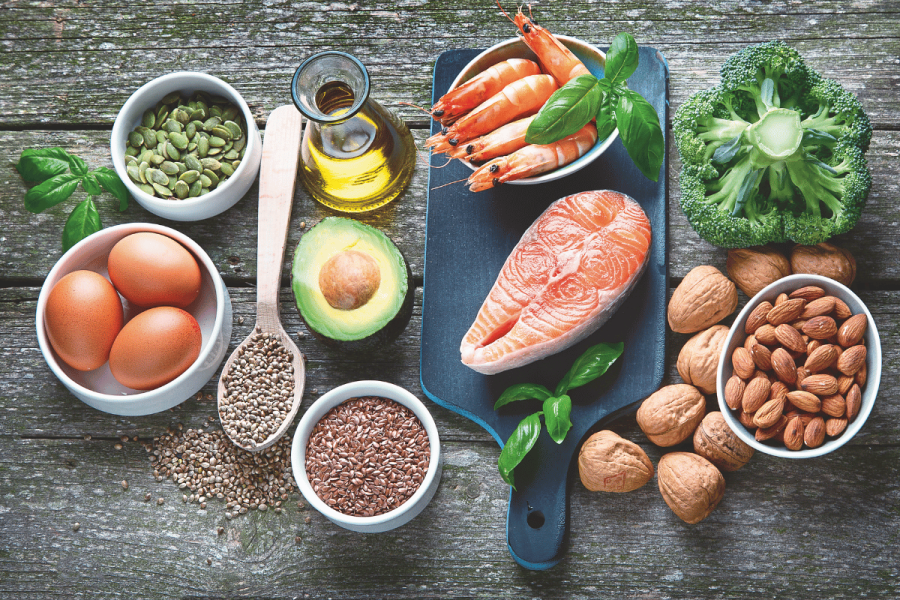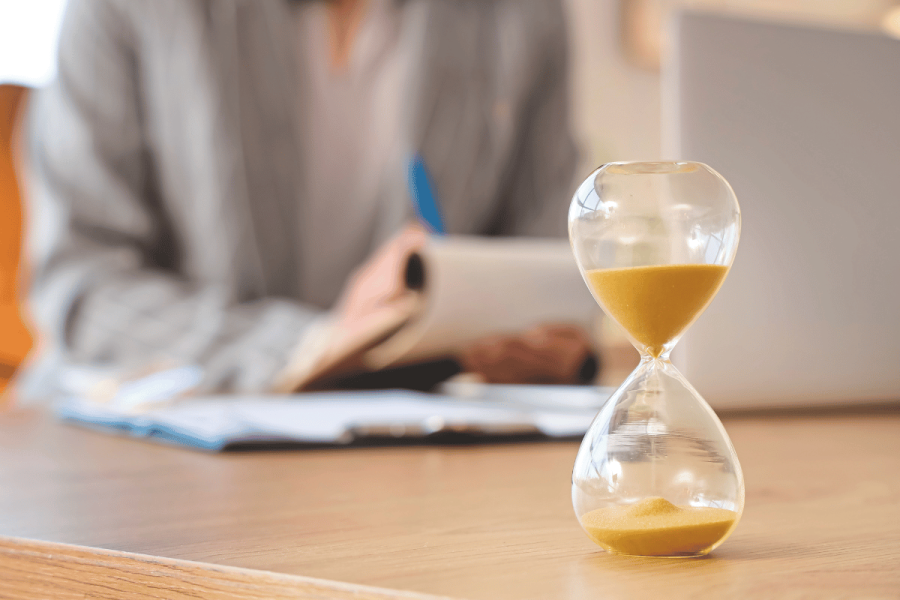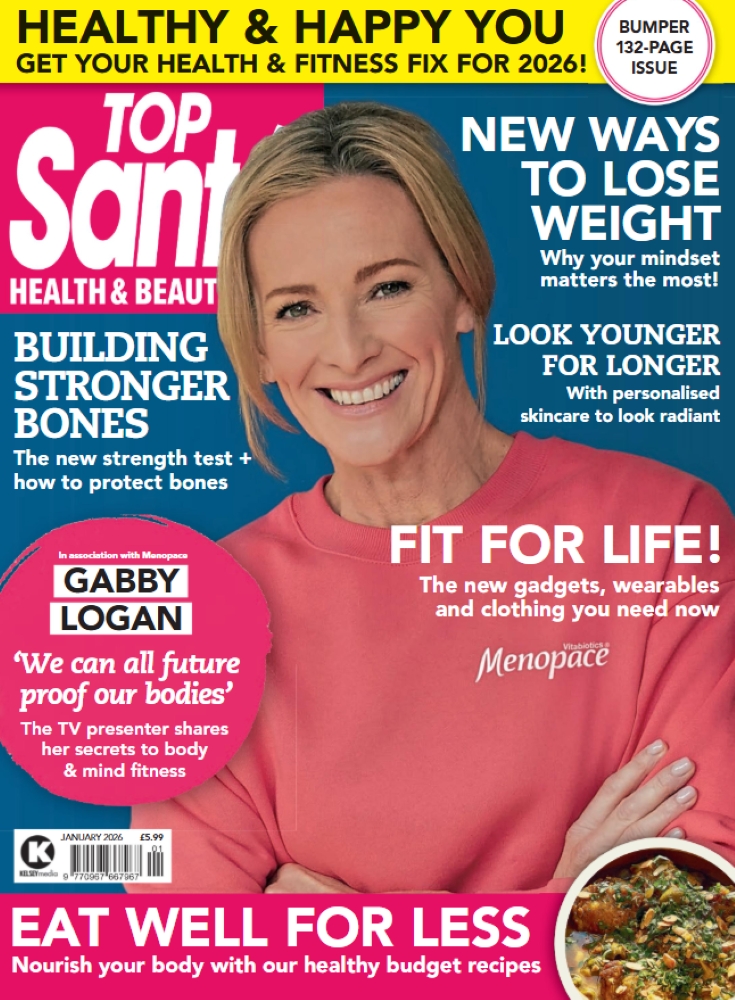Three experts share their nutrition, exercise and mindset approaches to anxiety, which can increase in midlife around menopause.
Words: Pauline Cox, Kate Rowe-Ham, and Suzy Reading. Images: Shutterstock.
Pauline says…
Pauline Cox is a functional nutritionist. Her latest book is Hungry Woman: Eating For Good Health, Happiness + Hormones. She runs health food store and café Sow and Arrow near Bristol (sowandarrow.com). Follow her at instagram.com/paulinejcox.
If you are finding yourself feeling increasingly anxious as you enter your 40s, then you are not alone! As women transition through perimenopause and beyond, many notice anxiety creeping in or intensifying. It can feel unsettling, especially if you’ve never considered yourself an “anxious” person before. Changes in mood, sleep and anxiety levels are extremely common during this time of a woman’s life and reflect the hormonal shifts and changes that the body is moving through during this period of the female hormonal landscape.
Oestrogen and progesterone are more than just sex hormones – they play an important role in supporting brain chemistry and emotional state. Oestrogen, for example, supports serotonin, the “feel-good” neurotransmitter, while progesterone has a naturally calming effect. As these hormones decline during perimenopause, their impact on your nervous system and mood becomes evident, leaving you feeling more vulnerable to stress, poor sleep and anxiety.
This is why you can find yourself increasingly on edge, restless, or lying awake with a racing mind. Understanding the connection between changing sex hormones and mood is the first step to making improvements, and nutrition and lifestyle can be powerful tools to help!

Creating balance
A focus on balancing blood sugar, by eating protein with every meal, including healthy fats such as olive oil, avocados, linseed, chia seed, nuts, and oily fish, and steering away from quick, sugary fixes can see big changes in mood, inflammatory levels and energy.
Blood sugar spikes and crashes are closely linked with feelings of anxiety and irritability, and whilst they can provide a temporary feel-good fix, over the long term they impact your body’s ability to manage blood sugar and carbohydrate tolerance. Supporting healthy blood sugar balance can help the fuel system in your brain, keeping your metabolic health optimal, as can choosing foods that provide the nutrients needed to support the nervous system.
Magical magnesium
Supporting your nervous system with targeted nutrients can also make a difference. Magnesium, sometimes called “the calming mineral” can ease muscle tension and support sleep. When progesterone levels decline, a calming brain hormone called GABA also declines. Magnesium helps to support declining levels of GABA, soothing a stressed nervous system and supporting deep sleep.
Incorporate plenty of magnesium-rich foods into your diet, including leafy greens, dark chocolate, almonds, cashew nuts, black beans and avocados. A high-quality, bioavailable magnesium supplement, such as magnesium biglycinate, can also be effective if you suffer with poor sleep and anxiety.
Oh mega!
With increasing research coming out about the importance of healthy omega fats to protect the female brain from neurodegenerative conditions such as Alzheimer’s disease, there is also evidence to back their importance for supporting mood, sleep and cognitive function. These areas can all be affected during perimenopause and menopause.
Not only are these important omega fats anti-inflammatory, they also form the membranes of the brain cells and other cells of the body, making them an essential nutrient to consume on a regular basis. Oily fish and seafood are a good source of essential brain fats, however, for many individuals not consuming seafood or fish on a regular basis, a daily, high-quality supplement can serve as a brain-protective tool for longevity and the immediate symptoms of perimenopause and menopause.
Try Regenerative Omegas – made with British, regeneratively farmed ahiflower oil, it’s a clean, effective fish oil alternative that supports brain, heart, skin, hormone and gut health (available at most good health food shops, £29.99). Remember, when it comes to anxiety, there is no one, single answer. Supporting the nervous system comes down to a number of factors: good sleep, time in nature, minimising stimulants such as caffeine and sugar, and eating to support your brain and hormonal health.
To learn more about eating for hormone health, read my book, Hungry Woman: Eating for Good Health, Happiness + Hormones (£30, amazon.co.uk).

Kate says…
Kate Rowe-Ham is a PT specialising in helping midlife women get strong and feel good. She’s the founder of app Owning Your Menopause (owningyourmenopause.com) and a patron of the Menopause Mandate. Follow her at instagram.com/katerh_fitness.
Anxiety can show up in many different ways, such as racing thoughts, a restless body, poor sleep, or that overwhelming sense of unease that seems to appear out of nowhere. For many of us, shifts in hormones throughout life, whether that’s monthly cycles, postnatal changes, or the transition into midlife, can make those anxious feelings more noticeable.
Fluctuating levels of oestrogen and progesterone during perimenopause and menopause directly impact brain chemistry. When combined with the demands of modern life, it’s understandable why anxiety may feel more prominent. One of the most effective and accessible tools to help quiet the mind is right at our fingertips: exercise. When we move our bodies, we create a powerful chemical shift in the brain. Exercise triggers the release of endorphins, dopamine, and the feel-good messengers that help stabilise mood and bring a sense of calm.
At the same time, movement lowers cortisol, our main stress hormone. This one-two effect is why you often feel clearer, lighter and more grounded after even a short walk or workout. Beyond the chemical changes, exercise provides something else equally important: a sense of control. When anxiety makes life feel unpredictable, choosing to move, whether that’s rolling out a yoga mat, lifting weights, or heading outside, creates structure and routine.
That simple act of doing something for yourself helps you regain a sense of balance. Different types of movement can support anxiety in different ways. Strength training builds both physical and mental resilience, reinforcing a sense of capability and strength. Cardiovascular exercise, like running, swimming or even dancing around the kitchen, helps release pent-up tension and energy. Gentle practices such as yoga, stretching or tai chi calm the nervous system and bring the body back into rest-and-repair mode.
And please let’s not underestimate the power of walking outdoors; nature itself is a proven stress reliever. The key isn’t about pushing yourself harder or fitting into someone else’s idea of fitness. It’s about consistency and finding what feels good for you. Even 10 minutes a day can make a meaningful difference. Think of movement as a form of self-care tool to steady your mind, improve your sleep, and help you feel more at home in your body. Anxiety may never disappear completely, but exercise can help manage it. By moving regularly, you’re not just supporting your physical health, you’re creating a calmer, more resilient mind too.
5 quick ways to move when anxiety strikes
1. Step outside for a brisk walk – even 10 minutes will do.
2. Put on your favourite song and dance it out.
3. Try a few rounds of slow, deep yoga stretches.
4. Drop into a plank or wall sit to release nervous energy.
5. Do 20 squats or push-ups – fast mood lifters that also ground you.

Suzy says…
Suzy Reading is a chartered psychologist and coach, and her new book How To Be Selfish comes out next month. Suzy’s practical toolkit helps you feel safe to advocate for yourself, so you can prioritise self-care and also receive love and support from others. Find her at suzyreading.co.uk and at instagram.com/suzyreading.
With all the fluctuations of hormones during perimenopause, it is common to experience anxiety or to find your symptoms worsening. First and foremost, be gentle with yourself. So often we tell ourselves we must be stronger or chastise ourselves for not being resilient enough. It is not a personal deficit; we need a suite of practices that we can turn to when we need soothing.
One of the simplest ways that you can support yourself in moments of anxiety is to run the tip of your tongue around your top row of teeth, 10 times one way and 10 times the other way. As you do this, notice how it increases the production of saliva in your mouth, which is a cue to your nervous system that it is safe to come down off high alert.
Practice this initially in moments of ease, enjoying the feeling of softening in the jaw, and build your capacity to be there for yourself when emotions are feeling more charged. It is natural to worry and sometimes we do some useful problem-solving during periods of rumination, but don’t let your mind run wild with anxiety-driven imaginings.
Bring perspective to your thinking using the following coping strategy: give yourself a couple of minutes to generate the worst-case scenarios, while also considering some things you can do or some people you could draw on for support if that outcome was to occur. Once time is up, that’s it, shift your attention to the best possible outcome, for the same length of time. Lastly, set your timer again and now reflect on what you think the most likely outcome might be.
During the day, when your mind is drawn back to this issue, earmark time to do the same practice again tomorrow. It’s not time for it now, but you will make space for it again the following day. This is also a period of our lives when we are often facing several competing needs, and where there is so much happening for ourselves personally that we might not have the same capacity to cope with the demands that are made of us. Grant yourself permission to be just one human being. Permission to have needs and feelings of your own.
Permission to do things differently. Sometimes this will mean disappointing other people, even sitting with your own disappointment when you can’t be all things to all people. I know this can be deeply challenging but you can learn to prioritise yourself and to advocate for yourself, and you don’t just need self-care, you also need to be cared for!
Please get brave and speak up about your needs – the tongue around the teeth exercise can help you feel safe to voice your opinions and you’ll find more practices like this in How To Be Selfish. You matter too, my darling – remember that.







